Schools examine data frequently to identify what is driving improvement and revise improvement plans.
When administrators at Veterans Memorial Elementary School in Central Falls, Rhode Island, began closely analyzing data in January 2014 to find ways to increase student achievement, they determined that low student attendance was contributing to low proficiency rates.
“We can’t improve scores if our students are not here,” Veterans Memorial principal Ann Lynch said.
One of the steps Lynch and her team took to change things was to recruit and train a dozen “parent navigators” to help them communicate the importance of regular attendance to parents and guardians and identify issues contributing to absenteeism. Another strategy was for these navigators to reach out to parents whose children are missing a lot of school to enlist them as partners in increasing attendance.
Every day a student does not come to school, his or her family is automatically notified by telephone of the absence. Separately, parent navigators and the school counselor meet regularly to look at aggregate attendance data, discuss trends and decide which families should be contacted personally.
Other strategies include distributing flyers about the importance of being in school and talking about attendance in student assemblies and, when there is a problem, asking parents to pledge to make sure their children come to school. In addition, the school works with families to identify the cause of absences and determine how administrators, counselors and others can help, such as by providing transportation or other social services such as housing assistance. Another strategy the school has used is offering rewards for strong attendance such as school dances, breakfast with the principal, and free homework passes.
The effort seems to be paying off at Veterans Memorial, where the strategy was fully launched in the fall of 2014. The number of absences dropped from 358 during the first 30 days of school year (SY) 2013-2014 to 256 during the same period in SY 2014-2015. Chronic absenteeism, which is defined as 18 absences or 10 percent of the school year, was cut in half in the fall quarter compared with the previous spring.
Better Collaboration Between State and Districts
The campaign to increase attendance at Veterans Memorial Elementary is supported by school turnaround experts at the Rhode Island Department of Education (RIDE) and represents just one example of a shift that has occurred in the relationship between RIDE and its lowest-performing schools and districts. In the past, when RIDE intervened at a school to help improve student achievement, it generally just pressed a school to meet the goal it had set for itself rather than help the school do so. Now, RIDE staff meet throughout the year with school and district leaders to identify problems, set goals to solve them, and use data to track progress.
“We feel like this is a great support to us,” Central Falls Superintendent Frances Gallo said. “We don’t feel like this has been a hammer coming down on the schools’ heads. Traditionally, you heard the State was coming and you wanted to run the other way.”
RIDE is supporting about 30 schools, including Veterans Memorial, in this manner. RIDE used part of its Federal Race to the Top and School Improvement Grant funds to pay the additional cost of hiring specialists to assist the districts and schools. Rhode Island also is taking advantage of the flexibility awarded to some States that requested waivers from some Elementary and Secondary Education Act provisions. So, for example, schools identified for intervention in the State no longer have to choose only from one of four models for whole-school reform (closure, restart, transformation or turnaround). Instead, they can choose from a menu of interventions that target the school’s needs. While there are still requirements about how many strategies must be chosen and what types, schools are able to take a much more tailored approach.
Under the old turnaround process in Rhode Island, schools needing to make significant changes based on poor performance would create improvement plans, as mandated by RIDE, and submit quarterly progress reports. RIDE staff would then review the documents and meet with the schools to discuss tasks that had not been completed, RIDE Transformation Specialist Sarah Anderson said. RIDE offered schools little hands-on help in meeting its goals. That wasn’t working.
Wanting to find an approach that would be more productive, transformation specialists began meeting with the schools, beginning in spring 2013, four times a year to help them collect and analyze a variety of data and discuss ways to adjust their improvement plans to speed their progress, Anderson said.
In the case of Veterans Memorial, the RIDE staff started meeting with a team that included the principal and other school and district leaders in 2014. They worked together to devise the strategy for increasing attendance. Typically, when the agreed-upon strategies are working, the team will stick with them. If not, however, there is both an opportunity to discuss the strategy’s shortcomings and the flexibility to shift gears.
School Improvement Plan Updated Frequently
Now, a school’s improvement plan “is a working-living document,” said Carolyn Johnston, principal of the Lillian Feinstein Elementary School at Sacket Street in Providence. She said the plan should reflect the adjustments made along the way. “This process allows schools to say this isn’t working and not feel threatened,” she said.
Central Falls High School principal Joshua Laplante also appreciates the new partnership with RIDE. “You can’t work in isolation,” he said. “We sit there with RIDE and we walk through our goals and we walk through next steps. Before, it appeared to be strictly about monitoring. We’d make a claim. They’d check for compliance. There is much more support now.”
Using Data to Improve
A hallmark of the quarterly meetings is their intense focus on data. Typically, each meeting has a focus, zeroing in on one or two major problems, rather than going over a lot of issues plaguing the school.
RIDE created customized “data dashboards” to help the schools keep track of their progress. The dashboards include schools’ interim assessment data, survey data and information collected during principals’ observations of classroom instruction. Each school’s dashboard includes information that is of particular interest to the school―in the case of Veterans Memorial, detailed attendance data.
In this way, RIDE is pushing schools to think about and look at data more proactively, Johnston said. “Say an intervention involves using six core instructional strategies to improve learning in the classroom. We don’t just then sit and wait to see student outcome data. We do walkthroughs and conduct teacher surveys, so we can say ‘six out of 10 classrooms this week were using X instructional practice.’” Anderson said that kind of granular data were too often overlooked in the past.
The next steps agreed to by the school, the district, and RIDE also are displayed on the dashboard.
Building Capacity to Support Schools and Districts
University of Connecticut School of Education Professor Jennie Weiner, an expert in school reform and school leadership who helped create RIDE’s data dashboards, said she hopes the schools will soon move away from needing extensive help from RIDE.
“We’re hoping to see a cultural shift,” Weiner said. “We want schools to be able to think this way and do this work on their own without RIDE eventually. They look at student outcome data, but this way they also look at other data, including qualitative and survey data to see if interventions they’ve put in place are being rolled out well and received well.”
It looks like that’s beginning to happen broadly in Rhode Island. Gallo even has implemented quarterly meetings which resemble the meetings facilitated by RIDE, in schools that are not identified for State intervention.
“This means that if I’m offering professional development, teachers are completing an evaluation on the way out the door,” she said. “I’m looking at all the data, including qualitative data. We’re using this same format in the schools that are not labeled as low performing and asking the same questions. Everyone here now understands the importance of data.”
Takeaways:
- Focus on data. The first step in putting together a new school improvement plan and monitoring progress should be examining a variety of relevant data, not just student outcome data.
- Play a support role. States should examine how they can both monitor for compliance and better support schools struggling to turn around low achievement.
- Meet more than once a year. States should consider scheduling quarterly rather than annual school improvement meetings with districts and schools identified as needing improvement.
- Pay attention to what the adults are doing. When trying to bring about change in schools, examine how both adults and students are changing how they work and learn.
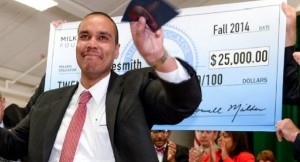 cators throughout the country. Nesmith used part of the award to fund a college scholarship each year for four years to a Bloomfield High School senior interested in becoming an educator.
cators throughout the country. Nesmith used part of the award to fund a college scholarship each year for four years to a Bloomfield High School senior interested in becoming an educator.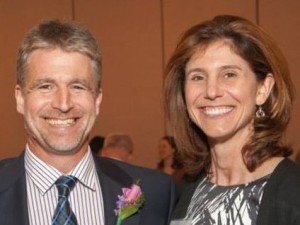
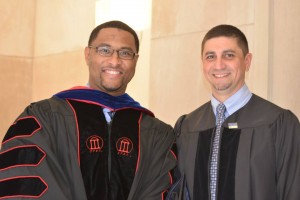
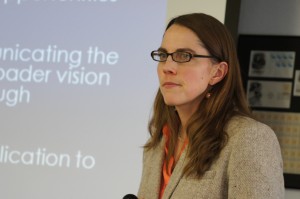
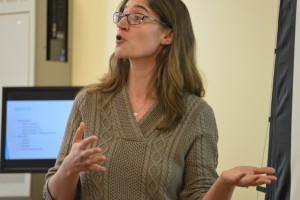
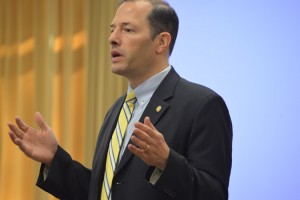 nversation with Representative Andy Fleischmann” this past November at the Storrs campus. As the chairman of the Education Committee of the Connecticut State Assembly, State Rep. Fleischmann (West Hartford) spoke about the future of education in Connecticut schools and how education policy research could better inform policy making in Hartford and beyond.
nversation with Representative Andy Fleischmann” this past November at the Storrs campus. As the chairman of the Education Committee of the Connecticut State Assembly, State Rep. Fleischmann (West Hartford) spoke about the future of education in Connecticut schools and how education policy research could better inform policy making in Hartford and beyond.